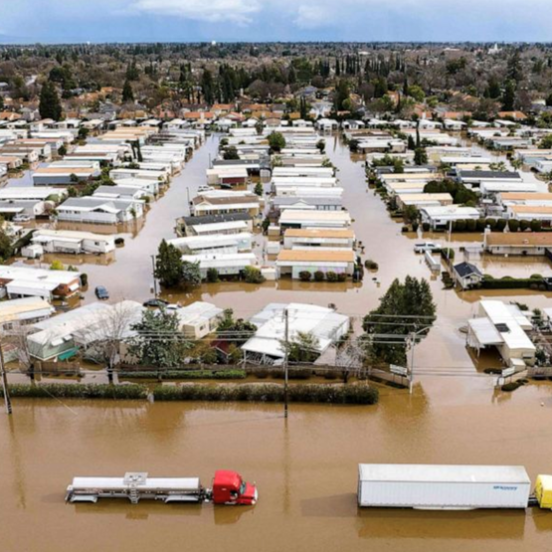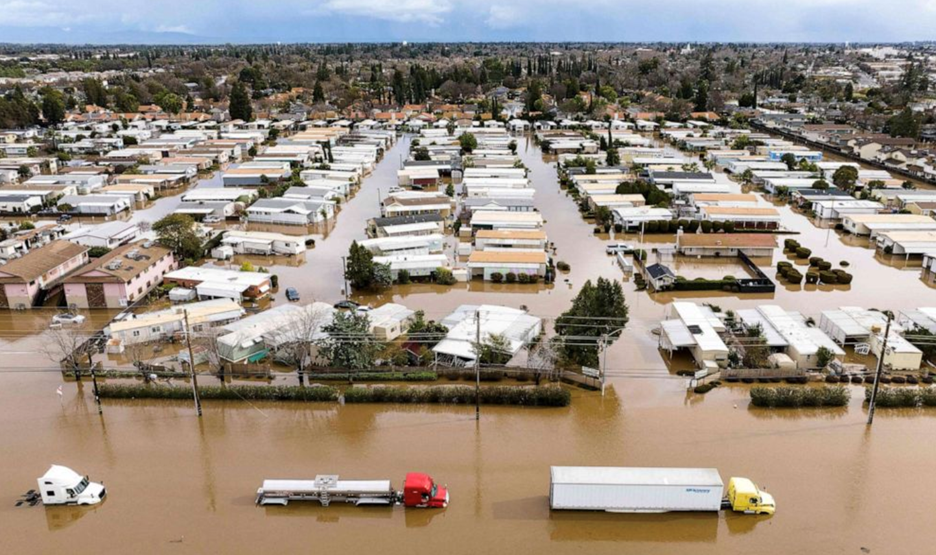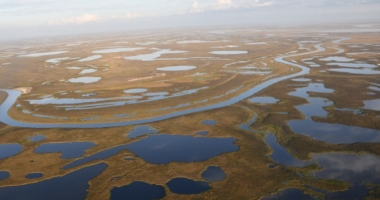Climate, Health and Equity Brief
Universal impact, lagging commitments and a ticking clock
January 23, 2023

The Climate, Health & Equity Brief is GMMB’s take on the week’s news on the current impacts of climate change. If you haven’t subscribed yet, you can do so by clicking here.
Hot Topic: Universal impact. A range of stories this week shows just how vulnerable people from all demographic and geographic groups are to the intensifying impact of climate change.
A new study found that in the youngest among us—children under three years old—climate change-related extreme heat, drought and precipitation are globally correlated with diarrheal disease, which kills more than half a million young children each year. And for the elderly, extreme weather poses particular risks. In Puerto Rico, slow recovery after hurricanes Maria and Fiona is driving young and working-aged people to emigrate, leaving behind an aging population far less capable of rebuilding.
Demographically, the fact that the climate crisis poses the greatest risk to low-income communities is clear. Recent extreme weather and flooding in California have underscored the vulnerability of the unhoused, 70% of whom live outdoors in the state compared to 40% nationwide. A new study found that in Los Angeles County, Black residents are 79 percent more likely than white residents to live in areas at risk of waist-high flooding in the event of extreme storms.
Yet the rich are also learning that the climate crisis doesn’t discriminate. Last week, the Colorado River drought prompted officials in the affluent city of Scottsdale, Arizona cut off the entire water supply to residents of its tony Rio Verde Foothills suburb, where median household income is twice the national average. And extreme heat disrupted play at the Australian Open, with temperatures reaching nearly 100°F and resulting in hours of postponed games and frustrated players of the well-heeled sport.
Still, it is the billions of people in the developing world who must bear the worst impacts of a crisis their economies didn’t create. Despite this, not one wealthy country has announced a commitment to the Loss and Damage Fund created at COP27 to help poor nations cope.
As John Kerry said in essence this week at Davos, referring to our ability to achieve a low-carbon economy, there is hope we will get there—it just may not be in time to avoid the worst of the climate crisis.
— Matt and Traci, GMMB
The Brief is moving to a bi-monthly publishing schedule in 2023. We look forward to arriving in your inboxes every other week.
Human Health
A new study found that climate change-related extreme heat, drought, and precipitation are globally correlated with diarrheal disease in children under three years old – a disease that kills more than half a million children each year. (Grist)
Officials estimate up to $1 billion in losses from the more than three weeks long atmospheric river storms in California, which killed at least 20 people, led to more than 500 landslides and was the wettest 10-day period in 25 years. (Los Angeles Times and San Francisco Chronicle)
A new study estimates that 9 out of 10 people globally inhabit areas that will experience catastrophic heat weather events by the end of the century, with poorer and more rural areas facing the most severe impacts. (Salon)
Planetary Health
As Earth warms, climate scientists warn that atmospheric rivers like those that have recently devastated parts of California may be amplified, bringing even more destruction and threatening ecosystems, infrastructure, homes and communities. (The Washington Post)
New research revealed that 2022 was the hottest year on record for the world’s oceans, raising concerns about potentially devastating consequences for marine and terrestrial ecosystems as the oceans absorb 90% of the excess heat from greenhouse gas emissions. (Phys.org)
Equity
A recent study showed that black residents of Los Angeles County are 79% more likely than white residents to be living at risk of deep flooding, and that recovery from floods is often prolonged for socially marginalized, vulnerable communities. (The New York Times)
As Puerto Rico struggles to recover from a series of climate disasters, young and working-aged people are emigrating, leaving behind an aging population that is especially vulnerable to deadly storms and less capable of rebuilding in the wake of the devastation. (The Washington Post)
Sacramento offers a case study in how extreme weather, wildfires, and flooding are endangering homeless people, especially as the percentage of unhoused Americans who are living outdoors has increased to 40%. (Los Angeles Times)
Politics & Economy
A World Economic Forum report released this week at Davos found that while climate change is the global economy’s “biggest long-term challenge,” it is the one world leaders are least prepared to tackle due to a focus on pressing, shorter-term problems. (CNBC)
A new study revealed that ExxonMobil knew the extreme risks and dangers of climate change as a result of fossil fuels as far back as 1977, contradicting their claims to investors and the public downplaying climate change threats throughout the 21st century. (AP News)
The Biden Administration, hampered by conservative courts, reduced funding, and staffing challenges, is falling behind in its environmental and climate goals, concerning many that the administration will run out of time to solidify key regulations. (The Washington Post)
A NOAA report concluded that 2022 was the third-costliest year for U.S.natural disaster losses, which totaled $165 billion and killed 474 people in 18 different extreme weather events. (The Guardian)
A new report revealed that U.S. carbon emissions rose by 1.3% in 2022 even as renewable energy surpassed coal power nationwide, putting the U.S. further behind in meeting its global pledge to cut emissions by 50-52% by 2030. (The New York Times)
The world’s most influential central banks are pushing back on the expectation that they do more to tackle climate change, citing the need to remain within the mandates of central banks and avoid becoming climate policymakers. (CNBC)
The U.S. Treasury Department will require hundreds of the nation’s large insurers to submit detailed homeowners insurance policies and claims to assess whether insurance is becoming increasingly scarce or unaffordable in communities particularly vulnerable to climate change. (Scientific American)
Life as We Know It
Extreme heat disrupted play at the Australian Open, with temperatures reaching as high as 97°F— stage five on the tournament’s heat stress scale— resulting in hours of postponed games and frustrated players. (CNN)
A report found that climate change misinformation on Twitter is surging under Elon Musk’s leadership, with tweets using terms such as “climate hoax” and “climate scam” up 300% and the most widely shared tweets passing without warning labels despite Twitter’s policy to flag them. (USA Today)
As extreme weather events and shifts in temperature and humidity become more common, archivists and conservators are struggling to protect books and archives, and digitization requires vast amounts of energy, which adds to emissions. (The New York Times)
The city of Scottsdale, Arizona cut off the water supply to the Rio Verde Foothills suburb with 1,000 residents, citing the unprecedented Colorado River drought and leading families to take drastic steps, including storing water in their pools for daily activities. (ABC News)
Action
EPA Administrator Michael Regan announced $100 million for projects to advance environmental equity for underserved communities and those facing disproportionate pollution, the largest-ever U.S. earmark for environmental justice funding. (The Hill)
Kicker
Wondering how to discuss climate change with your child? Check out NPR’s comic book guide to climate change.
Today, fossil fuel producers and their enablers are still racing to expand production, knowing full well that their business model is inconsistent with human survival.”
– UN Secretary General António Guterres
The GMMB Climate, Health & Equity Brief would not be possible without the contributions of the larger GMMB California team—Thomas Baer, Aaron Benavides, Stefana Hendronetto, Sharde Olabanji and Quincy Tichenor. Feedback on the Brief is welcome and encouraged and should be sent to CHandEBrief@gmmb.com.






